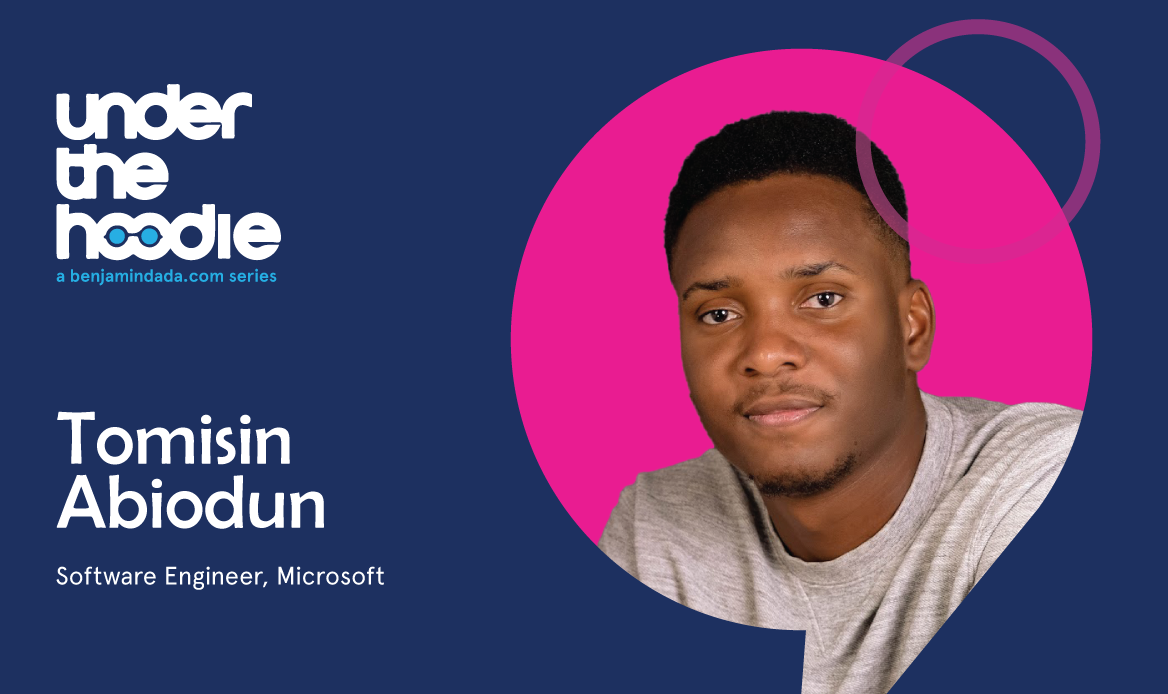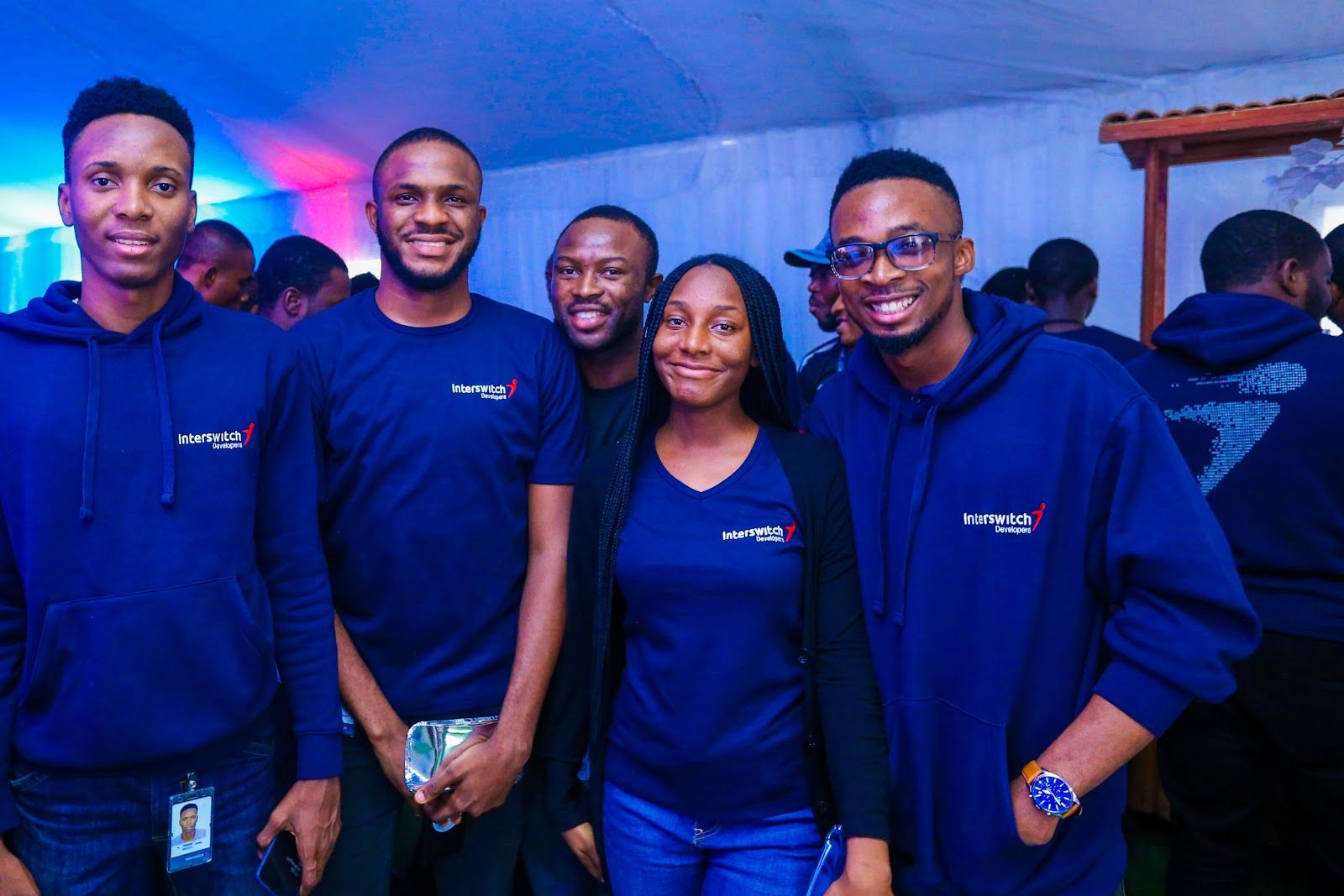From math class to Mixed Reality: The inspiring story of Tomisin Abiodun
Inspired by his high school mathematics teacher, Tomisin Abiodun started a career in tech as a software engineer and is now a Mixed Reality innovator at Microsoft. How was the journey, he talks about it in this interview.

With two to three hours of electricity every day for about two years, Tomisin Abiodun built an application that would lead him to a relationship that landed him his first role as a software engineer. A career path that he picked interest in after his high school mathematics teacher introduced him and his classmates to QBasic programming language.
Currently, Tomisin works as a mixed reality innovator at Microsoft Mesh. In this episode of Under The Hoodie, he talks about his career journey and what he is learning about problem-solving.
Hey Tomisin, let’s get to know about you
My name is Tomisin Abiodun, I am a full-stack software engineer with over five years of experience and I have worked at different companies, including a YC-backed one and an African fintech unicorn. I am currently working at Microsoft Mesh, enabling digital creators to host their applications on the software.
What kickstarted your career in tech?
Hmm. That’s an interesting question.
My high school mathematics teacher was my first inspiration, he made the QBasic programming language so simple and enticing when he taught us in class. Through the lessons, I believed that I could use the language to automate so many things.
So, after classes, I had an exercise book where I started writing QBasic programmes to help me check my assignments to be sure that my solutions are correct. That was how it started.
After this, I did not get to code often until I got my first laptop while I was in 200 level; that was when I picked up Python to build other things. However, I will say that my maths teacher was the person that made me pursue programming.
How did you get your first job?
During my five years at Afe Babalola University, I created a lot of applications with Python. Some of the apps were not high-quality apps that could get 100K users, it was just products that people around me found interesting. That was what gave me the drive.
My first app was a note-taking app—this was at the time when Evernote was popular, the app was integrated with the university’s learning management system and it was publicly accessible to every student.
After this app, I built a mood and habit-tracking app—Trails, when I was in my final year. It was inspired by James Clear’s book; Atomic Habits and after watching Silicon Valley and the Social Network. Thereafter, I started searching online for senior software engineers who have expertise in Python to guide me on how to improve the app so that it will scale.
This was because I was not comfortable with the level that the app was at the time.
I found someone called Tosin Animashun, and I told him about Trails, and he shared it with his boss who was impressed and invited me for an interview. After the encounter with his boss, they gave me some time to learn since I was not familiar with a lot of things that they were using as a fintech company. The learning period lasted for two months then I joined Bloc (formerly TechAdvance) during my NYSC service year in 2018.
On the importance of building habits for career growth
“Our vision and goals are not what takes us where we are, our growth is spurred by our habits,” I have always thought of life this way and someone re-echoed it to me recently.
While in the university, one of my coursemates—who later became the valedictorian in our set, was always at the top of the class every semester. I noticed that he had a “routine life”; from studying to carrying out his responsibilities as the class representative. He had something during every single hour, even his leisure time was pre-planned.
Looking at his achievements at the time, I realised that if I want to grow academically and in my career like him, I will need to adopt a “routine life”. After I conceived the thought, It was a natural progression for me to not be casual and lackadaisical, reading Atomic Habits also gave me more context on how to build habits.
I have come to realise that you are not going to get where you want to be simply by having visions or goals, you will get there through the habits you are imbibing today.
After Bloc, Tomisin went to Cowrywise, Interswitch and now at Microsoft
During my time at Bloc, Tosin and his team at PyCon Nigeria were hosting a conference and I decided to participate. I mean, my line manager is doing something so I should be part of it. Also, it was my first time attending a physical tech event.
This conference was particularly memorable for me because they organised a coding contest and I was one of the five winners of the competition. At the time, I did not know that the contest was organised by Cowrywise and I did not even know the names of the winners were noted down.
Three months after I was done with my service year at Bloc in 2019, I was looking out for the next big thing that I could work on, and someone from Cowrywise reached out to me; “Hey, you were one of the winners of the Cowrywise coding contest at PyCon, we are looking to scale and we will like to have a conversation with you.” I met with the company’s founder and I was hired two weeks later. It was a step up from Bloc, at the time.
Prior to Cowrywise offer, I was applying to different companies and Interswitch was one of those. They got back to me in like three to four months, and they came with an offer that was exciting and I could not say no.
At Interswitch, I was to lead the team to improve the mobile app of Quickteller Paypoint. In 2020, about a year at Interswitch, we launched an improved version of the app, Quickteller Paypoint 2.0; the launch of the new platform saw an average of 44.8% rise in the user base of the new application, a 6.1% increase in the average engagement time of the new application, and most significantly, a 35.9% uptick in revenue.
At the time I left Interswitch, it was the company’s highest-rated app.

In August 2021, I got an offer from Microsoft, which I don’t think is an offer anyone can refuse because of the size and impact of what I will be doing and the fact that it's a pioneering space. My job description at Microsoft is creating products that empower creators to host their apps on the metaverse.
Tomisin faced some challenges at the start of his career
Prior to joining Bloc, I was working on two to three hours of electricity every day, the power supply in 2016 and 2017 was extremely poor. Every day, any idea or task that I had, I will have to execute within those two hours; 12:00 PM to 2:00 PM (that was the time when power is available). My laptop’s battery was faulty, so it could not retain power.
Within this short period, I was able to create and even build an app that I could share with Tosin, which led to my first job and other opportunities. Expensive internet was a challenge too. Internet is still expensive but it was more expensive [for me] back then.
The Importance of upskilling and advice for aspiring software engineers
Upskilling is constant! A senior engineer is only senior at his current company, if he goes elsewhere, he will still have to learn some basics. As much as you want to build expertise in a particular framework or domain, you need to continuously learn how to solve problems and also learn things that are framework agnostic.
Some of the best ways to upskill are by learning from others; through reading books, studying codes on GitHub and getting mentors.
Another piece of advice is that you should build as much as you can. It helped me to kickstart my career, there is nothing as interesting as practical hands-on experience. People, including employers, can use it to judge your competence.
After building make sure you share the product with others and also try to network with professionals in the industry; most times they get to recognise your skill and often times tend to share opportunities with you or correct you and point you in the right direction.
Are you a flying-high African tech talent and you want to be covered in this series? Send an email to johnstone[at]benjamindada[dot]com or fill out this form. We will respond within 48 hours, on weekdays.






